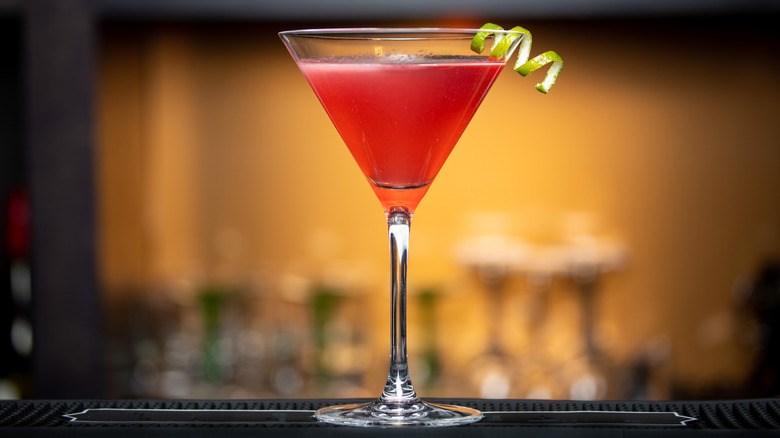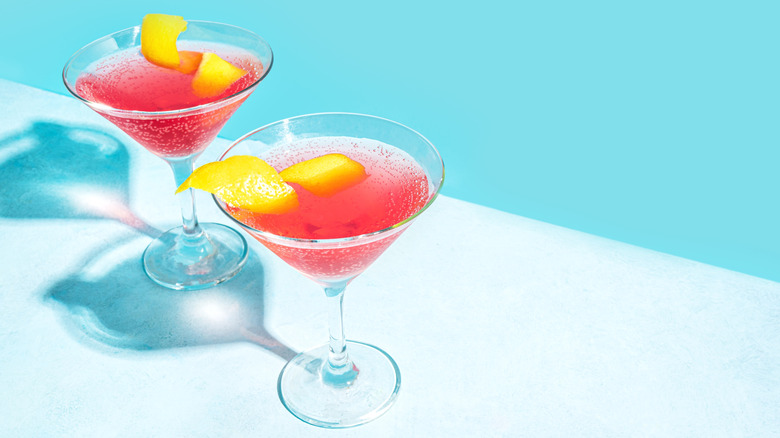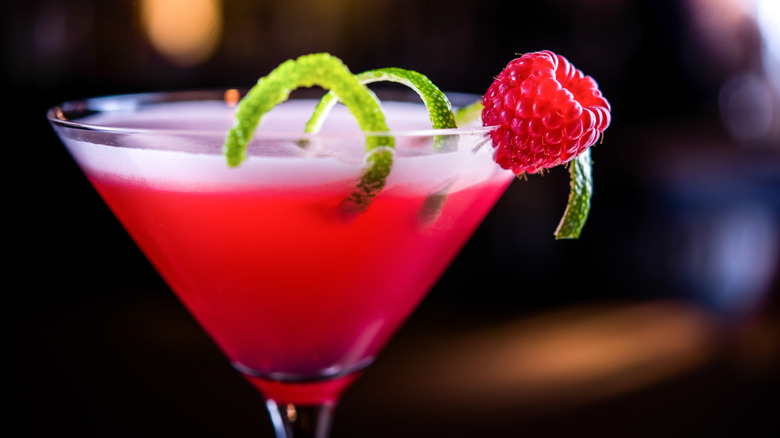What Is A Metropolitan Cocktail And How Does It Differ From A Cosmopolitan?
Ever since vodka came into vogue in the US in the 1950s and 1960s, it has been a go-to choice in cocktails where the other ingredients' flavors play a starring role. Drinks like the cosmopolitan and the metropolitan are perfect examples because the vodka lets the fruity qualities of each drink shine through. These days, the choice of vodkas is vast; whether you favor an imported style or an American-made vodka for your drinks is up to you. However, by choosing a flavored vodka, you can enhance the non-alcoholic elements even further. This is, to a great extent, what the cosmopolitan and the metropolitan show us.
These two drinks are simply variations on a theme. They contain almost all the same ingredients but for a slight tweak in the type of vodka used, which spins the metropolitan in its own unique direction. The cosmopolitan is a zingy combination of citrus vodka, cranberry juice cocktail, lemon juice, and triple sec. Cranberry juice cocktail, with its added sugar, is generally chosen instead of pure cranberry juice, which can be too tart for the drink. The metropolitan switches out the citrus vodka for blackcurrant. Some recipes will drop the triple sec, maybe change the garnish, or add a lime twist instead of the usual lemon. Regardless, the cocktail is a clear kissing cousin to the cosmopolitan with a more berry-forward flavor.
Here's the story of the cosmo
Recipes for the cosmopolitan date back to the early 20th century; it appeared in print in Harry MacElhone's "Barflies and Cocktails", but this concoction — equal parts sweet vermouth, dry vermouth, Swedish punch, Scotch whisky, Irish whiskey, and Russian vodka — was about as far in the opposite direction of today's cosmo as a recipe could be. Flash forward to the 1960s when Ocean Spray cranberry juice advertised the harpoon cocktail, a simple blend of either vodka or light rum and cranberry juice, sometimes served with a splash of soda water and a squeeze of lime. Then, in the 1970s, the kamikaze, a shooter of vodka, triple sec, and lime juice, was all the rage.
These drinks create a logical foundation for the modern cosmopolitan, but the official origin of this drink is roundly disputed. Bartender Neal Murray claims the earliest bragging rights. While working in a restaurant near Minneapolis in 1975, he took a kamikaze and added a splash of cranberry. According to legend, a patron said, "How cosmopolitan," and the name stuck. Bartender Cheryl Cook disputes this, saying that she originated the drink in 1985, while experimenting with a test-market bottle of Absolut Citron. The pink color caught on like wildfire. Then in 1988, Toby Cecchini used the officially released Absolut Citron with Cointreau rather than generic triple sec to offer his own take on the drink, which he had learned about from a friend in San Francisco. Today, you can order a cosmo in almost any bar, and the recipe will by and large be the same.
The metropolitan's invention shows how cocktail culture evolves
Cocktails evolve. Whether it's the name, the recipe, or both, cocktail culture continually builds on itself. Change, oftentimes improvement, sometimes just a variation. Just as the cosmopolitan name has been bestowed on multiple cocktails, the metropolitan shares its moniker with an earlier metropolitan, with no vodka involved, just a combination of brandy, sweet vermouth, simple syrup, and Angostura bitters. Before the cosmo, the combination of vodka and cranberry was, by turns, known as the red devil, the cape codder, and the harpoon. In this case, the names changed, but the recipe remained the same. In other cases, like the metropolitan, a simple switch of ingredients makes one drink become another.
Flavored vodkas were, and still are, a game changer for bartenders (or even home mixologists) looking to play around with ingredients, boost a flavor, and put their personal stamp on a cocktail. The first officially released flavor was Absolut Peppar, which added oomph to bloody marys. When Absolut Citron arrived, Cecchini nabbed it for his cosmo. Then, in 1993 at Marion's Continental Restaurant in New York, bartender Chuck Coggins ditched the Citron for Absolut Kurant, creating his metropolitan. Still a cosmo at heart, but also a reinvention all its own. And just like that, the cocktail repertoire expands.



